Betta Fish Food Types
Welcome to the underwater Betta culinary adventure! When it comes to feeding your betta fish, a balanced and varied diet is essential for their health and happiness.
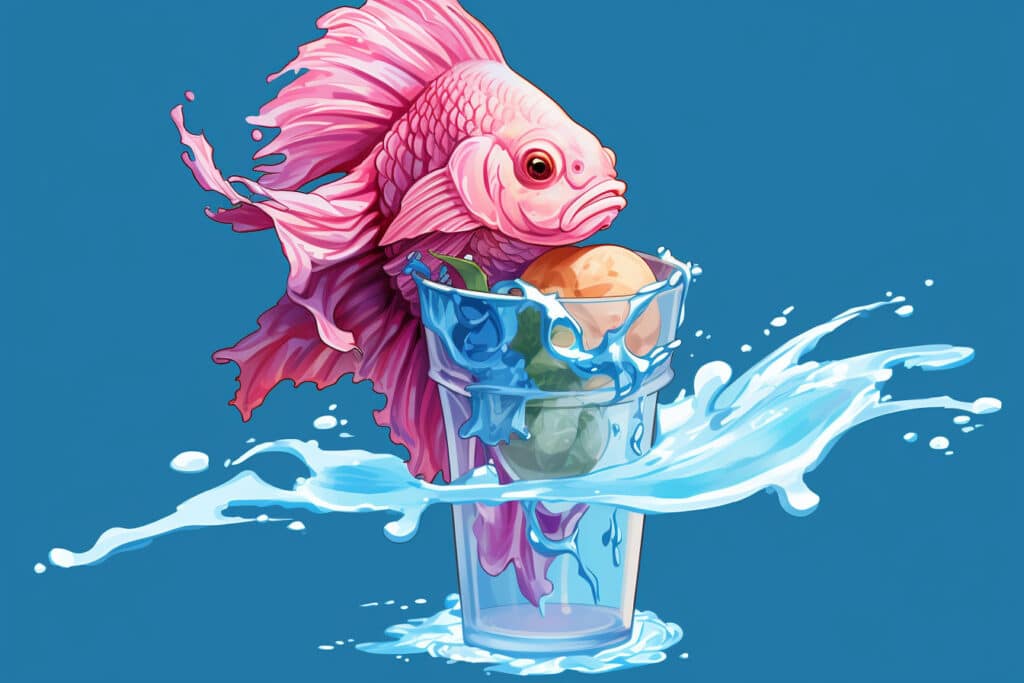
Just like humans, bettas need a proper nutrition plan and a healthy diet to thrive and show off their vibrant colors. That’s why it’s crucial to offer them high quality food packed with essential vitamins and nutrients.
From high protein foods to delectable treats, we’ll explore the world of betta fish food and uncover the secrets of creating a menu fit for a fishy connoisseur. So, let’s embark on this epicurean journey and ensure your betta enjoys a healthy and diverse diet that will make their fins flutter with delight!
Table of Contents 🦑
A Quick Heads-Up… If you come across links on this page that take you to products on Amazon Associate or other partner stores, they’re affiliate links. This means if you decide to make a purchase, BettaReef earns a commission, but at no extra cost to you.
Betta Fish Food in The Wild
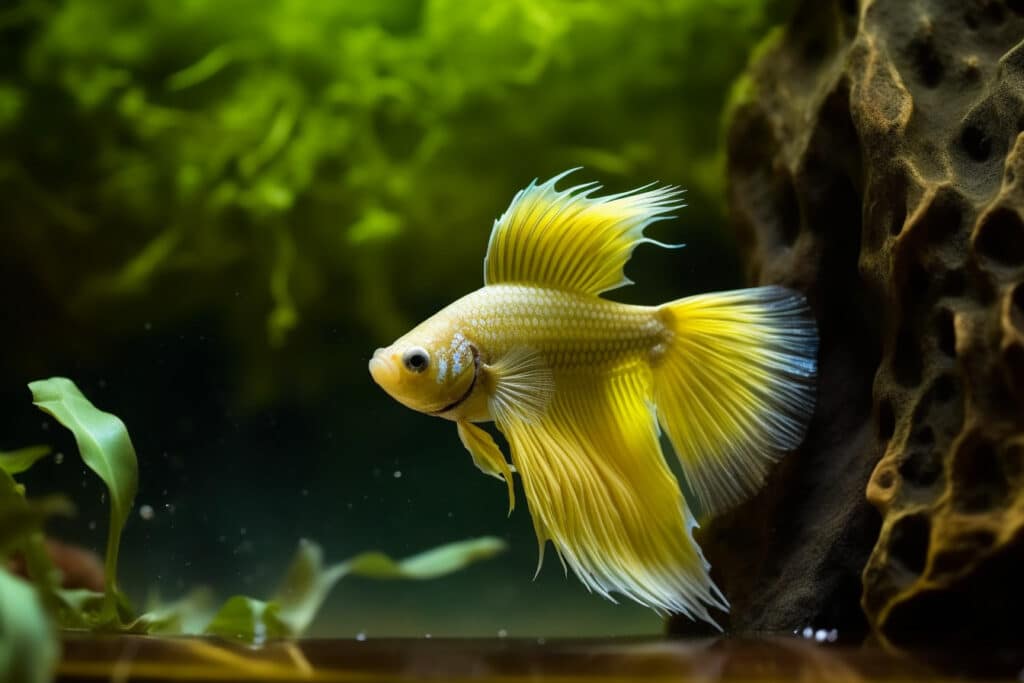
To understand what are the best food types for our aquatic friend we need to understand what usually betta fish eat in their natural environment.
Betta fish are skilled hunters and have a specialized mouth structure that allows them to capture and consume their prey.
In their natural habitat, betta fish, like many tropical fish, have a diverse and varied diet, betta fish are carnivorous and their natural diet consists of protein-rich foods, they primarily feed on small insects, mosquito larvae, zooplankton, small crustaceans, worms, and other insect larvae, which provide them with essential nutrients for their growth and energy needs.
Their natural diet plays a significant role in their overall health and vitality.
Types of Betta Fish Food In Captivity
When it’s time to nourish your captive betta fish, there are several types of betta food available that can meet their dietary needs. It is important to offer a variety of foods and also the best nutritional value to ensure a balanced and healthy diet.
Here are 6 main types of the best betta fish food to consider:
Pellets.
Flakes.
Frozen Foods.
Freeze-dried food
Live Foods.
Plant-based Food.
Pellets
When it comes to betta fish food, pellets are a popular and convenient choice for many betta fish owners. Betta fish pellets are specially formulated to provide a balanced diet for these beautiful tropical fish. They are designed to meet the nutritional needs of bettas, ensuring they receive essential vitamins, minerals, and high-quality protein.
One of the advantages of using betta fish pellets is that they are easy to feed and portion. The pellets are usually bite-sized, making it convenient to give your betta fish the right amount of food without overfeeding.
The pellets expand upon contact with water, making them suitable for bettas to consume. This feature helps prevent bloating and ensures that the fish can comfortably eat the pellets.
When feeding betta fish pellets, it’s important to follow the recommended portion size based on the size of your betta fish. Overfeeding can lead to health issues, so it’s essential to provide the appropriate amount of pellets for your fish’s size and metabolism. Additionally, remember to soak the pellets briefly in tank water before feeding to soften them and make them easier for your betta fish to eat.
Betta fish pellets come in various sizes, and it’s important to choose pellets that are appropriate for the size of your betta fish’s mouth. Some popular brands known for their quality betta fish pellets include Omega One Betta Buffet Pellets, Hikari Betta Bio Gold Pellets, ocean nutrition betta pellets, and TetraBetta Floating Mini Pellets.
Betta fish pellets are an excellent staple fish food for your betta fish. They offer a convenient and nutritionally balanced diet that supports their overall health and well-being.
By choosing high-quality betta pellets and feeding them in the appropriate portion sizes, you can provide your betta fish with the essential nutrients they need for a happy and thriving life.
Flake Food
Flakes are another popular option among betta fish owners.
Betta flakes, also known as tropical fish flakes, are thin, small, and lightweight pieces of food that float on the water’s surface. They are designed to provide a balanced diet and proper nutrition for betta fish.
Betta flakes come in various brands and formulations, offering a wide range of choices for betta owners. One well-known brand that produces betta flakes is Omega One. Their Betta Buffet Flakes are specifically formulated to meet the dietary needs of betta fish. These betta buffet flakes are made with high-quality ingredients and offer a complete and balanced diet for bettas.
Another popular option is the TetraBetta Floating Mini Pellets, which are small flakes that are easy for bettas to eat.
Feeding betta fish flakes is a simple and convenient process. You can sprinkle a small number of flakes onto the water’s surface and observe as your betta fish eagerly swims up to eat his delicious fish food.
It’s important to feed only the amount of flakes that your betta fish can consume within a few minutes. Overfeeding can lead to health issues, so it’s crucial to provide the appropriate portion size.
One advantage of betta fish flakes is their versatility. They can be easily crushed into smaller pieces or even powdered, making them suitable for bettas of different sizes and ages. This allows you to adjust the food to meet the specific needs of your betta fish. However, it’s important to note that betta fish flakes can sometimes cause water cloudiness if not consumed quickly. To prevent this, ensure that your betta fish eats the flakes within a few minutes and remove any uneaten portions from the tank.
In conclusion, betta fish flakes offer a convenient and nutritionally balanced option for feeding your betta fish. Brands like Omega One Betta Buffet Flakes and TetraBetta Floating Mini Pellets provide quality choices of fish food that cater to the dietary needs of bettas.
By feeding the appropriate portion sizes and ensuring the flakes are consumed within a few minutes, you can provide your betta fish with a varied and satisfying diet.
Frozen Fish Food
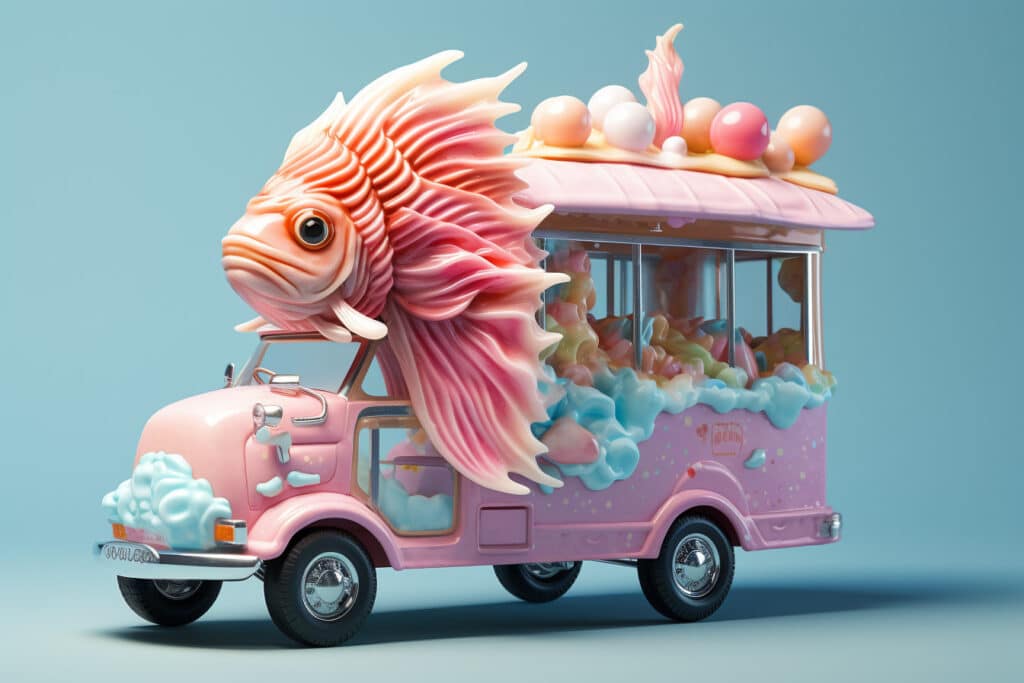
When it comes to feeding betta fish, frozen foods are an excellent option to consider. Frozen fish foods offer a variety of nutrients and flavors that can enhance the diet of your betta fish and provide them with a diverse and nutritious meal.
One popular brand that offers a range of frozen fish food for pet fish is Hikari. Their line of frozen fish food includes options like bloodworms, daphnia, brine shrimp, and more. These are carefully prepared and flash-frozen to retain their nutritional value and freshness.
Feeding frozen fish food to your betta is simple. Just throw a small portion of the fish food in a separate container of aquarium water and then add it to the tank.
Be sure to remove any uneaten portions after a few minutes to prevent water quality issues.
Frozen fish food provides several benefits for bettas. They closely resemble the natural prey of bettas, offering a more natural and varied diet. They are also rich in essential nutrients and protein, which are important for the overall health and well-being of your fish.
One of the advantages of using frozen fish food is that they are often safer than live foods, which carry a risk of transmitting disease or parasites.
Frozen fish food is usually flash-frozen shortly after harvest, which can help to preserve its nutritional content while also killing off any potentially harmful pathogens.
It’s important to note that while frozen fish food offers numerous benefits, it should be used as a supplement to a well-rounded diet that includes other food types such as pellets or flakes. This ensures that your betta fish receives a balanced and varied diet.
Here are 5 types of frozen fish food you can feed your betta fish:
Bloodworms.
Daphnia.
Brine Shrimp.
Mysis Shrimp.
Cyclops
Frozen Bloodworms
Ah, the irresistible allure of bloodworms! These tiny, wriggly creatures are a betta fish favorite Packed with protein, they make a delectable and nutritious meal for your finned friend. Just watch as your betta darts and dances with excitement when these red delicacies enter the tank. It’s a feeding frenzy you won’t want to miss!
Frozen Daphnia
Looking to give your betta fish’s digestive system a boost? Daphnia is the answer! These tiny crustaceans not only provide a protein-packed meal, but they also aid in digestion and promote a healthy gut. Your betta will thank you for the added fiber and the satisfying crunch of these little critters.
Frozen Brine Shrimp
Dive into a feast fit for royalty with brine shrimp! These petite aquatic treats are like a gourmet meal for your betta fish. Bursting with protein and irresistible flavor, brine shrimp are a valuable dietary addition to betta fish.
As a source of animal-based protein, they mimic the kind of food bettas would consume in their natural habitats.
Brine shrimp are packed with nutrients that can contribute to a betta’s overall health, and their small size makes them easy for bettas to eat.
Frozen Mysis Shrimp
Treat your betta fish to a taste of the pond with mysis shrimp! These freshwater delights are a fantastic source of protein and essential nutrients. Watch as your betta’s vibrant colors intensify with each tasty morsel. Mysis shrimp are sure to make mealtime an exciting and satisfying experience for your aquatic companion.
Frozen Cyclops
Get ready for a microscopic marvel – cyclops! These tiny freshwater crustaceans may be small, but they pack a punch when it comes to protein.
Frozen cyclops are tiny crustaceans that make a nutritious and convenient food source for betta fish and other small aquatic pets. Named for their single eye, cyclops are rich in protein and other essential nutrients, which can contribute to the health and vibrancy of your betta fish.
These frozen betta fish food can be found in most pet stores or aquarium supply shops. It’s important to choose high-quality brands and ensure that the frozen foods are properly thawed before feeding them to your betta fish.
Remember to feed them in moderation and remove any uneaten portions to maintain water quality in the tank.
In conclusion, offering a variety of frozen food types to your betta fish will help replicate their natural diet and provide them with a balanced and nutritious meal.
Remember to rotate between different types of frozen foods to provide a diverse diet and keep your betta fish healthy and happy.
incorporating frozen foods into your betta fish’s diet can be a great way to provide them with a diverse and nutritious meal. Brands like Hikari offer a range of high-quality frozen options, including bloodworms, daphnia, and brine shrimp.
By feeding your betta fish a combination of frozen foods along with other betta fish food types, you can ensure they receive the essential nutrients and enjoy a fulfilling and healthy diet.
Freeze Dried Food
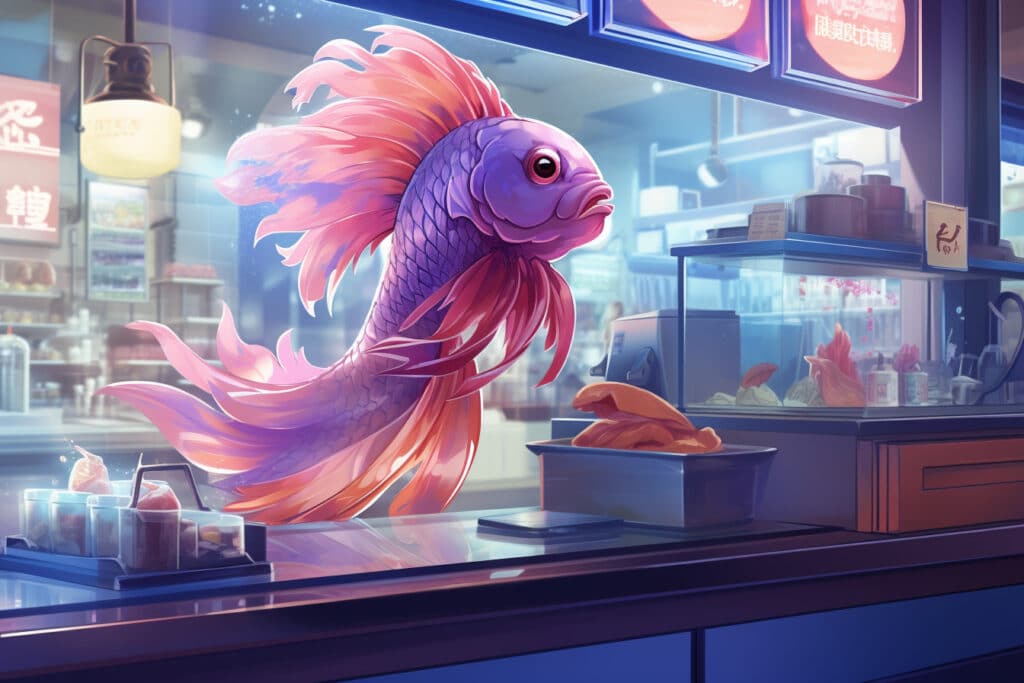
Let’s delve into the crunchy world of freeze-dried betta fish food, the convenient, storage-friendly delight that has won the hearts of many betta owners.
Freeze-dried foods offer an intriguing culinary twist in the aquaria, marrying the appeal of live foods with the convenience and safety of processed foods.
The freeze-drying process ensures the preservation of vital nutrients while eliminating the potential threat of parasites or diseases, presenting a dinner plate that’s not only packed with flavor but also meets high safety standards.
These crispy, lightweight morsels, whether they be bloodworms, brine shrimp, or daphnia, retain much of the nutritional value of their live or frozen counterparts but have the added benefit of longer shelf-life and easy storage. No need for refrigeration or defrosting – just pop open the container, sprinkle a pinch into the tank, and voila, dinner is served!
Variety is the spice of a betta’s life! While freeze-dried fish food can be a healthy part of your betta’s diet, it shouldn’t constitute the whole menu. Balancing them with other betta fish food types will ensure your finned friend enjoys a broad nutritional spectrum.
Remember to hydrate the freeze-dried fare before serving; they can be tough on a betta’s digestive system if fed dry.
Now, let the crispy banquet commence!
Here are 4 types of freeze dried fish food you can feed your betta fish:
Freeze Dried Bloodworms.
Freeze dried daphnia.
Freeze dried brine shrimp.
Tubifex Worms.
Freeze Dried Bloodworms
A betta fish favorite and one of the best betta food types, freeze-dried bloodworms, are rich in protein and highly enticing. Brands like Hikari Bio-Pure and Omega One offer high-quality freeze-dried bloodworms that are carefully processed to retain their natural nutritional value.
These delectable treats will have your betta fish swimming eagerly to the surface for each tasty morsel.
Freeze dried daphnia
Is another excellent option for betta fish food. This tiny crustacean is rich in fiber and aids in digestion, promoting a healthy digestive system for your fish.
Look for brands like San Francisco Bay and Tetra that offer freeze-dried daphnia in convenient packaging. Your betta fish will appreciate the variety and the added fiber in their diet.
Freeze dried brine shrimp
Are a fantastic choice to enhance your betta fish’s diet. These small, protein-packed crustaceans are a popular choice for feeding betta fish due to their high protein content and convenience, they are essentially brine shrimp that have been rapidly frozen and then dehydrated to remove moisture, this process preserves the nutritional value of the shrimp while making them long-lasting and easy to store.
Brands like Ocean Nutrition and API offer freeze-dried brine shrimp that are carefully processed to ensure maximum nutrition and flavor.
Treat your betta to a scrumptious meal of freeze-dried brine shrimp and watch their excitement unfold.
Tubifex Worms
Freeze-dried tubifex worms are another popular option of fish food for your betta fish, these small worms are a great source of protein and can be easily rehydrated before feeding.
Look for reputable brands like Tetra and Omega One that offer freeze-dried tubifex worms with no artificial additives or preservatives. Your betta fish will relish the opportunity to indulge in these nutritious and flavorful treats.
Freeze-dried fish food is a convenient and nutritious choice for betta fish owners. it provides the benefits of live foods without the need for refrigeration or live cultures.
Remember to soak the freeze-dried fish food in water before feeding to ensure easy digestion and prevent digestive issues. Treat your betta fish to a variety of freeze-dried options to keep their meals exciting and their taste buds satisfied!
Betta Fish Live Foods
When the stage is set for dinner in the aquatic kingdom of the betta fish, live foods are the entrée de résistance. Not only a source of vital nutrition, but live foods also add a dash of excitement to the betta’s feeding routine, invoking their instinctual hunting behaviors and providing an invigorating break from the mundanity of prepared foods.
Imagine the enchantment of your betta, their eyes gleaming with anticipation, as they watch the lively wriggling of a juicy bloodworm or the erratic, darting movements of brine shrimp in the water.
Live foods offer a spectrum of textures and flavors that bettas find irresistible.
As we delve into the world of live betta fish foods, let’s not forget about safety. Source your live foods from reliable suppliers to ensure they’re disease and parasite-free. A culinary delight should never be a health hazard, after all! In this grand theatre of the aquatic world, serving live foods is akin to treating your betta to a sumptuous banquet, full of variety, taste, and entertainment.
Let’s raise the curtains on the live food feast and let the performance begin!
Here are 5 types of live fish food you can feed your betta fish:
Brine Shrimp.
Daphnia.
Mosquito Larvae.
Blackworms.
Copepods.
Live Brine Shrimp
Brine shrimp, the minute crustaceans of the sea, also play a significant role in our betta friends’ diet. These creatures, sometimes colloquially referred to as “sea monkeys”, hold an allure for bettas that’s hard to rival. Their erratic, darting movements through the water stimulate bettas’ predatory instincts, providing not only a nutritious meal but also a natural hunting exercise for the fish. Their high protein content further ensures our bettas’ vibrant health and radiant colors.
Live Daphnia
Diving the tinier delicacies, we encounter daphnia, also known as water fleas. These micro-crustaceans, while petite in size, are a giant hit in the betta culinary world. The small size of daphnia makes them an excellent choice for bettas, stimulating their natural foraging behaviors and providing them with an easily digestible, nutrient-rich meal.
Live Mosquito Larvae
And who could forget the mosquito larvae? This natural food choice in the wild offers a different texture and taste, a crunchy delight for bettas accustomed to softer fare. Their high nutritional value combined with the joy bettas experience in hunting them down makes mosquito larvae a win-win addition to the betta diet.
Live Blackworms
Blackworms are small, thin worms that are highly nutritious for betta fish. They are rich in protein and other essential nutrients. You can culture blackworms at home or purchase them from reputable suppliers. Just make sure to rinse them thoroughly before feeding them to your betta.
Live Copepods
Last but not least, the tiny crustaceans known as copepods and terrestrial creatures like fruit flies deserve mention. These little morsels of nutrition provide variety to your betta’s diet, ensuring a broad spectrum of nutrients and keeping their feeding routine intriguing and fun.
To wrap it all up in a bubble nest, feeding your betta fish a variety of live foods mimics their natural diet, stimulates their hunting instincts, and contributes to their overall health and well-being. However, remember to source these live foods from reputable suppliers to ensure they’re disease and parasite-free. It’s like setting up a five-star, underwater restaurant for your betta, offering them a taste of the wild while ensuring their safety and longevity.
Bon Appétit, dear betta!
Plant Based Foods
Betta fish are primarily carnivorous and their diet in the wild typically consists of small insects and insect larvae. Their bodies are designed to process protein-rich food, not plant matter. While they can consume small amounts of plant-based materials, these should only form a very minor part of their diet.
It’s worth noting that some betta fish food products may contain vegetable matter as part of a balanced formulation, but these are usually designed to be part of a nutritionally complete diet.
Offering vegetables like peas and boiled spinach have been suggested by some fish owners as a home remedy for constipation, but these should be given sparingly and only in specific circumstances.
If your betta fish is experiencing digestive issues, it’s best to consult with a veterinarian who specializes in aquatic animals to get a proper diagnosis and treatment plan. Overfeeding or feeding them the wrong diet can lead to health issues, so it’s crucial to ensure your betta is getting the right nutrients it needs.
However, if you choose to supplement your betta’s diet with vegetables, make sure they are cooked and mashed to be easily digestible, and only in very small amounts. Remember, this should be an exception, not the norm, in their dietary plan. It’s always best to feed them high-quality betta fish food which is specifically designed to fulfill their nutritional needs.
In conclusion, while bettas can ingest small amounts of vegetables, it’s not advisable to make it a regular part of their diet. They should primarily be eating protein-rich betta fish food, like specially-formulated betta pellets or flakes, and occasionally live or frozen fish food such as bloodworms, brine shrimp, and daphnia.
FAQ About Betta Food
Q: How much food should I feed my betta fish
A: It’s crucial to strike a balance when feeding your betta fish to avoid negative repercussions. Providing an excess amount of food not only leads to health issues like bloating or constipation but also directly impacts the water quality in your tank. Uneaten food tends to decay, resulting in a buildup of harmful toxins which can create an unhealthy living environment for your betta. As a rule of thumb, only offer what your betta can consume within 2-3 minutes. By doing so, you can keep your betta healthy and ensure a clean, thriving aquatic habitat.
Q: How often should I feed my betta fish?
A: Typically, betta fish should be fed once or twice daily.
Q: What should I do if my betta fish is not eating?
A: A betta fish may refuse to eat due to various factors, such as illness, stress, or dislike of the food. If your betta refuses to eat, try changing the type of food. If the fish still doesn’t eat, it may be ill and require veterinary attention.
Q: Can I feed my betta fish human food, like meat or bread?
A: No, human food is not suitable for betta fish and can harm their health. Bettas require a specific diet to meet their nutritional needs.
Q: How long can a betta fish go without food?
A: While betta fish can technically survive up to two weeks without food, it’s not recommended to leave them unfed for more than a couple of days. Extended periods without food can lead to health problems.
Q: Why does my betta fish spit out his food?
A: Betta fish may spit out their food for several reasons, such as the food being too big for their mouth, they don’t like the taste, or they are trying to break it into smaller, more manageable pieces.
Q: What should I do if I accidentally overfeed my betta fish?
A: If you overfeed your betta, monitor it closely for signs of discomfort or bloating. You might want to fast the fish for a day to allow its digestive system to process the excess food. In the future, be careful to only feed the recommended amount.
In conclusion
Feeding your betta fish involves more than just tossing betta fish food into the tank. It’s an art that combines understanding the nutritional needs of your betta fish, with an appreciation for the diversity of betta foods and types available – from specially formulated pellets to live foods, frozen treats, and even freeze-dried options. It’s about maintaining a delicate balance of fish meal to avoid overfeeding and the ensuing health and water quality issues, and ensuring that your betta’s carnivorous instincts are satisfied with high protein content in their diet.
Each betta fish is unique, and part of the joy of betta ownership is learning about your fish’s tastes and personal preferences, all the while providing them with a diet that contributes to their health, happiness, and longevity.
It’s a journey filled with discovery and a testament to the fascinating world of these vibrant and lively creatures.
Thank you for taking the time to delve into the diverse dietary world of betta fish with us.
We hope that this information has been helpful to you in your ongoing journey as a betta fish keeper. Here’s to many happy and healthy meals for your betta!

Delighted to have you here at BettaReef! This place is a treasure trove of knowledge about Betta fish, Betta Care, Health, Gear, and much more from the wonders of aquatic life. My journey in this fascinating world began when I was just 8, and now, as a seasoned hobbyist, I’m here to help fellow Betta enthusiasts create a thriving Betta environment for a healthy life.
I’m committed to delivering high-quality content, backed by a stringent editorial process. Each product review is based on real-life usage and practical analysis, ensuring that you get insights and advice that truly matter.
Related Blog Posts:
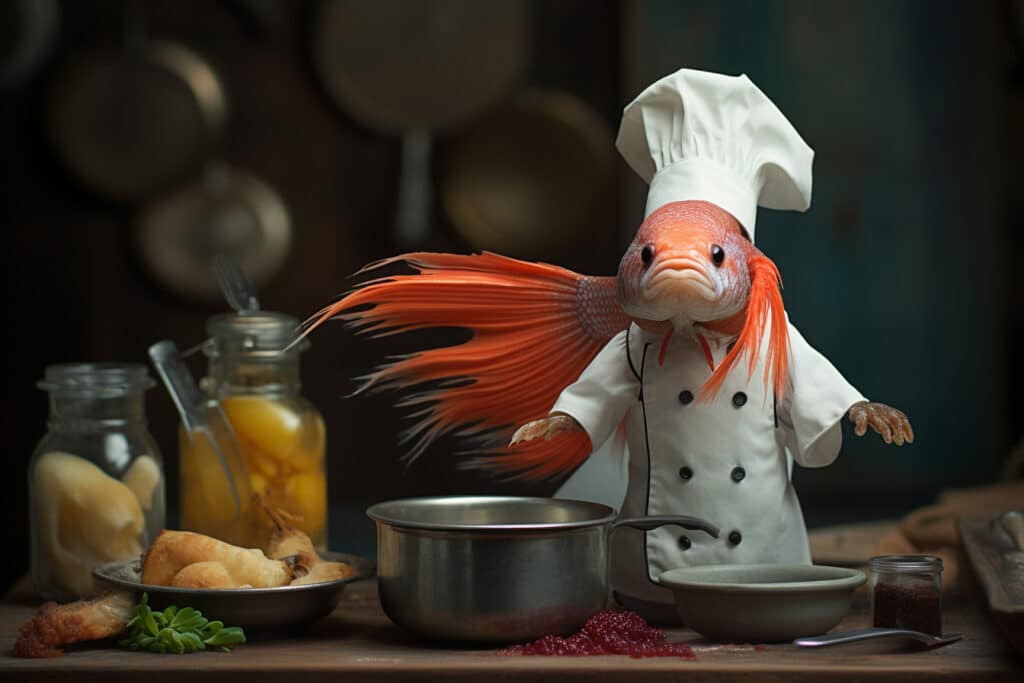
The Best Food For Betta Fish Top 5
Swim To 🤿 Home The Best Food For Betta Fish Top 5 Best Overall Fluval

How Long Can Betta Fish Go Without Food?
Swim To 🤿 Home How Long Can Betta Fish Go Without Food? In the bustling
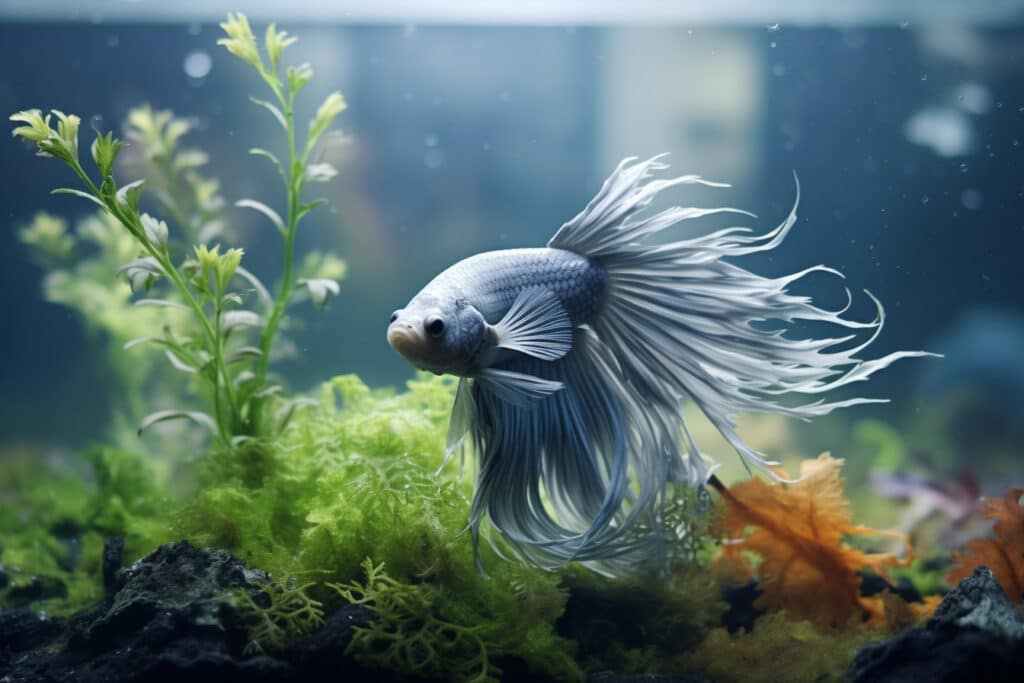
Why Is my betta fish not eating
Swim To 🤿 Home Why Is My Betta Fish Not Eating Why is my betta
